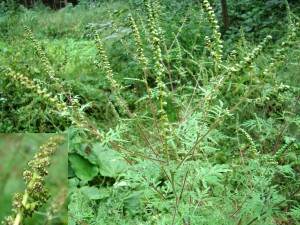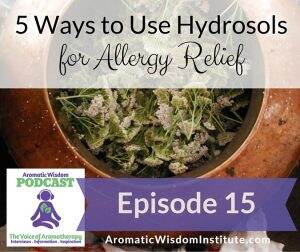Welcome to the Aromatic Wisdom Podcast!
Fall is infamous for triggering seasonal allergies. But do you know what exactly is causing your body to be flooded with histamines, making your nose run and eyes itch? Find out in today’s podcast episode! Listen as I share in detail how ragweed and mold affect you and how to address the symptoms of their effect on your respiratory system.
If you want to listen to another podcast about how aromatics can help with allergies, check out 5 Ways to Use Hydrosols for Allergy Relief
Resources and Links Mentioned in Today’s Show:
Common Ragweed – Ambrosia artemisiifolia

Antihistamine Essential Oils
- German Chamomile – Matricaria recutita
- Blue Tansy – Tannacetum annum
Suggested Decongestant Essential Oils
- Cardamom – Elettaria cardamomum
- Cypress – Cupressus sempervirens
- Cedarwood – Juniperus virginiana
- Eucalyptus – Eucalyptus globulus
- Juniper Berry – Juniperus communis
- Laurel leaf – Laurus nobilis
- Lavender – Lavendula angustifolia
- Peppermint – Mentha x piperita
- Ravintsara – Cinnamomun camphora ct. 1,8 cineole
- Rosemary – Rosmarinus officinalis ct. 1,8 cineole
- Scotch Pine – Pinus sylvestris
- Siberian Fir – Abies sibirica
- Spike Lavender – Lavendula latifolia
- Tea Tree – Melaleuca alternifolia
Do you have a place to keep all your blend recipes? If not, consider My Book of Blends. I created it for myself and realized so many other aromatherapists, professional and novice, could use such a book. With over 150 pages to name, rate, make detailed notes, list out the number of drops used and carrier oils used in your recipes, this book is the perfect place to keep them safe all in one, easy to use space. It makes a great gift with the holiday season, too!





Hi LIz
Great podcast!!!They are all great and I always look forward to them. My question is: What is the chemical component to look for in an oil that it will make it an antihistamine?
Thank you
Hi Cristina! That’s a fabulous question, and one that doesn’t have a straight answer. The anti histamine effects don’t actually seem related to one component in particular, but rather the whole oil.
A study done by Nigata University, Japan (Journal of Ethnopharmacology 2005 Oct 3; 101(1-3): 208-12) found that German chamomile was able to assist with effectiveness of antihistamine drugs in mice. What impressed the researchers was that administration of the antihistamine alone could not resolve puritus (itchy irritation) but when combined with German Chamomile essential oil, the antihistamine effectiveness was greatly enhanced. One could thus conclude that German Chamomile is a safe and even necessary herbal remedy for those that suffer from allergies and wish to increase the effectiveness of medications specified for their known allergens. Hope this helps! Liz
Hi Liz,
Great podcast! The info you provided about allergies was very informative. I personally do not suffer from allergies but others in my home do. Inhalers and steam inhalations are favorites and they love the relief they both provide.
My favorite part was the info you gave about ragweed, mold, and ways to help protect yourself. I think many people go on about their day taking allergy medicine without giving much thought about what is causing their allergies and ways they can help protect themselves. Many want to relieve their symptoms not realizing that they can decrease their exposure and use essential oils which can actually help their body feel better and fight back. This is what I love about essential oils. They are not just a band aide!
Thank you for your allergy and aromatic wisdom! =)
I’ve been listening and trying to catch up on the podcasts and have thoroughly enjoyed them but I’m a visual learner as well and I was able to download the show notes and follow along up to episode #12 but now I can’t find them so I can save them. Any help you can be would be greatly appreciated.
Thank You